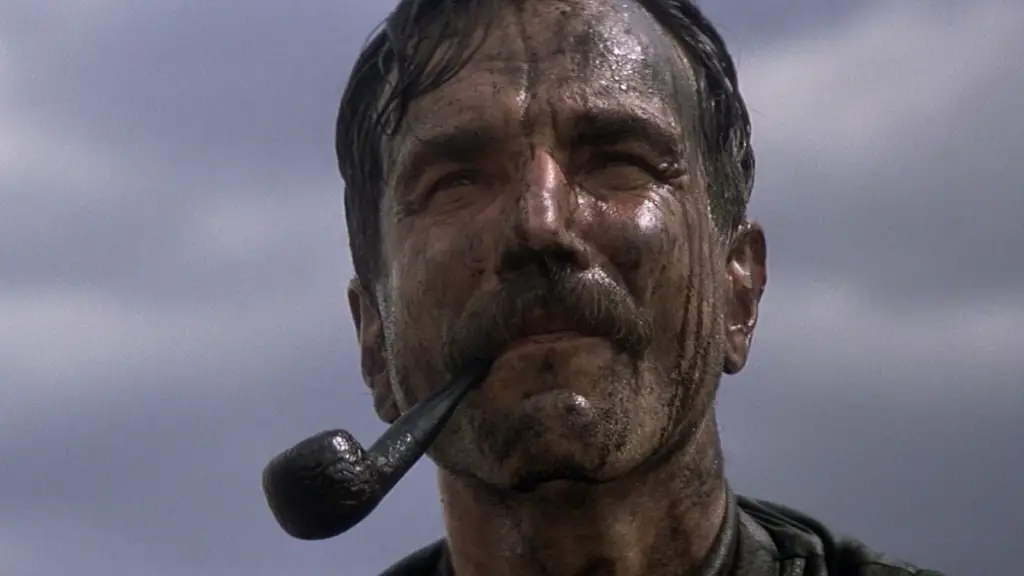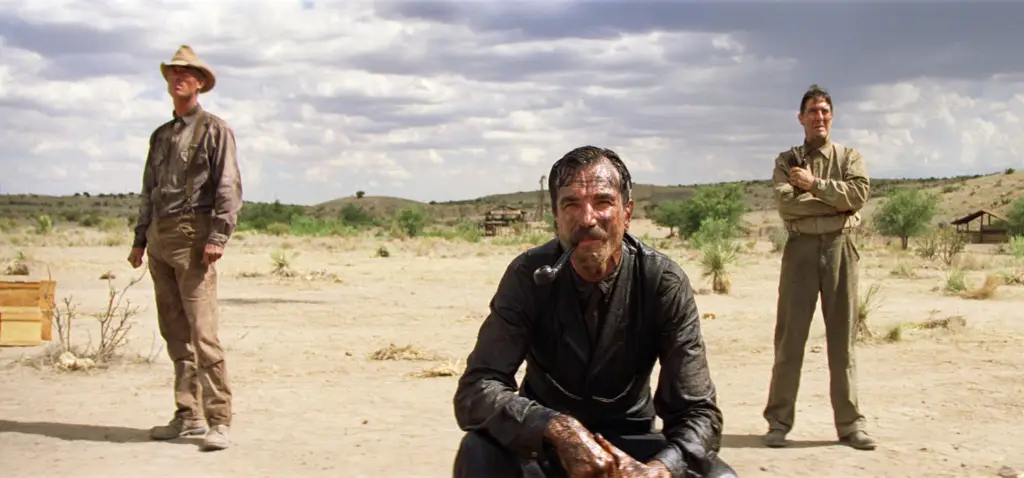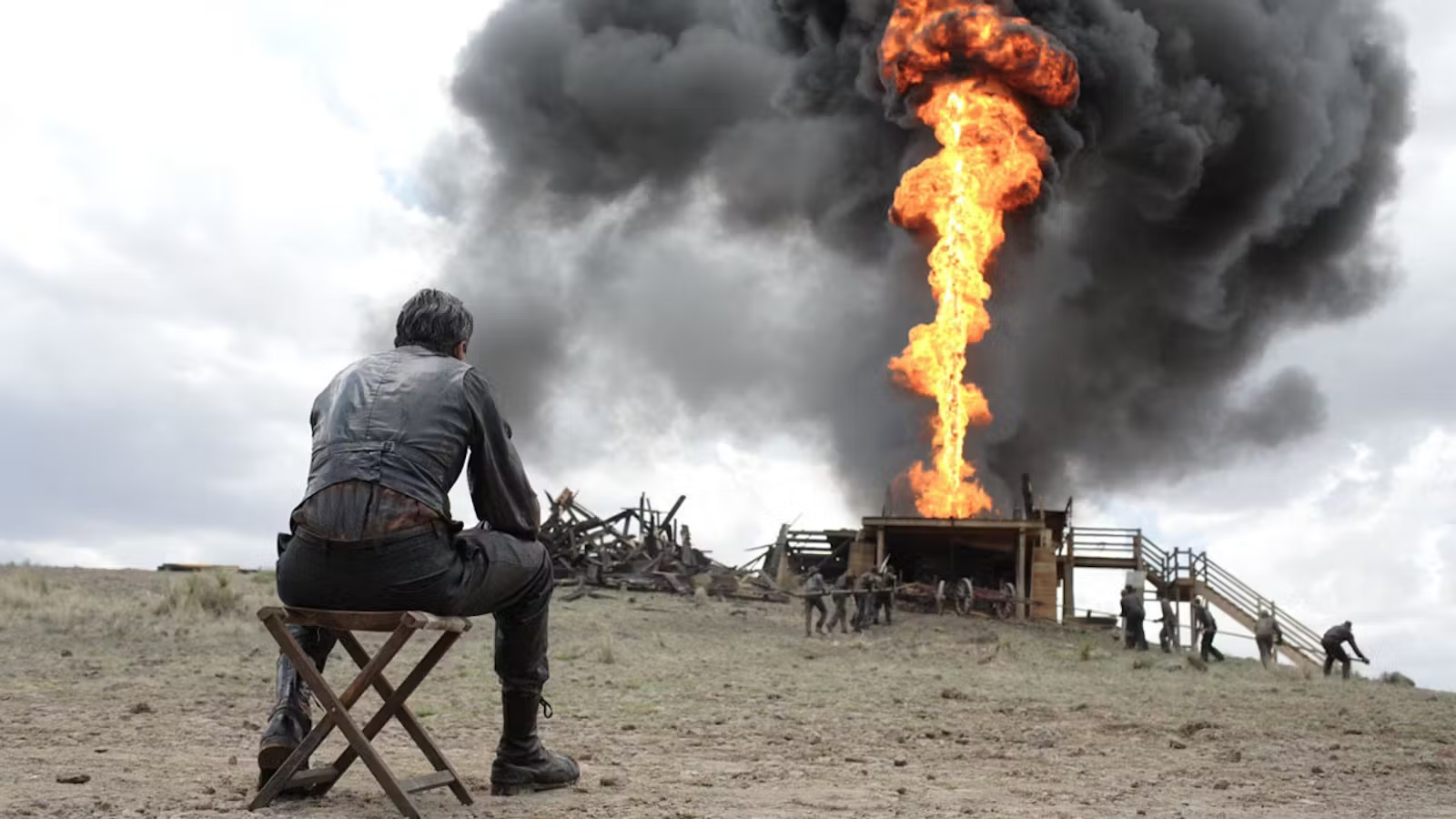Table of Contents
Introduction: The Essence of There Will Be Blood
“There Will Be Blood” stands as a profound exploration of human ambition, greed, and the ethical quandaries that surface in the pursuit of the American Dream. Directed by Paul Thomas Anderson and anchored by Daniel Day-Lewis’s unforgettable portrayal of the ruthless oilman Daniel Plainview, this film delves into the complexities of character and morality. Through a careful There Will Be Blood analysis, we can uncover the psychological and philosophical layers that inform Plainview’s decisions and interactions, as well as the narrative choices that amplify these themes.
This cinematic masterpiece not only reflects the historical backdrop of America’s oil boom but also raises questions about the nature of success and its inherent costs. As we unravel the film’s commentary on the darker sides of ambition, we will confront questions of identity, purpose, and moral ambiguity, making “There Will Be Blood” an enduring subject for critical discourse.
The Psychology of Greed: Unpacking Daniel Plainview’s Character
The Roots of Ambition
Daniel Plainview, portrayed masterfully by Daniel Day-Lewis, embodies the complexities of human greed and ambition. From the beginning, we see him as a determined and single-minded figure, driven by a relentless desire to acquire wealth and power. This pursuit is rooted in his past experiences, particularly his isolation and hardship as a silver miner. The notion that wealth equates to respect and security is a core theme in Plainview’s psyche, pushing him to pursue oil drilling with obsessive fervor.
As we analyze Plainview’s character, it becomes apparent that his ambition is not merely about riches but also about identity. He seeks to establish himself as a formidable player in the emerging oil industry, positioning himself against not only competitors but also societal expectations. This aggressive ascendancy manifests in his relationships, particularly with his adopted son, H.W. Plainview, as he often prioritizes his business ambitions over familial bonds. His inability to forge genuine connections highlights a fundamental emptiness that accompanies his insatiable drive.

The Duality of Greed and Isolation
Plainview’s character also presents a fascinating dichotomy between his outward charisma and inner turmoil. While he projects an image of confidence and control, a deeper sense of paranoia and insecurity lurks beneath the surface. His interactions with others are marked by manipulation and power plays, revealing a psychology steeped in distrust. The more he acquires, the more isolated he becomes, suggesting that his relentless pursuit of success ultimately alienates him from the very society he seeks to dominate.
This aspect of Plainview’s character is vividly illustrated in his dynamic with various counterparts throughout the film, such as Eli Sunday, who represents a competing form of ambition rooted in spirituality. The tension between these two characters underscores the idea that different paths to power can lead to conflicting ideologies—one driven by capitalist greed and the other by faith. Their relationship exemplifies the psychological battles that emerge when ambition knows no boundaries.
Consequences of Unchecked Greed
The film serves as a cautionary tale about the consequences of unchecked ambition and greed. Plainview’s journey paints a vivid picture of what it means to be consumed by one’s desires. His ruthless tactics, including deception and betrayal, expose a moral deterioration that raises questions about integrity and humanity.
In “There Will Be Blood,” the exploration of Daniel Plainview provides an insightful lens through which we can examine the darker aspects of human nature. This There Will Be Blood analysis reveals how ambition, when left unchecked, can lead to despair and disconnection, raising important questions about the essence of success and the price it exacts on the soul.
Existential Philosophy in There Will Be Blood: The Struggle for Meaning
The Quest for Identity
At its core, “There Will Be Blood” delves into existential philosophy, particularly concerning the quest for identity and purpose. Daniel Plainview’s relentless pursuit of wealth and power raises significant questions about the meaning of success and what it means to lead a fulfilling life. Unlike many protagonists who seek connection or love, Plainview primarily seeks validation through material gain, illustrating a starkly individualistic philosophy.
This inherent loneliness is palpable throughout the film, as Plainview’s intense focus on his ambitions alienates him from those around him. His interactions are transactional, devoid of genuine emotional connection. The film suggests that the drive to dominate—whether economically or socially—often leads to an existential void. Plainview may acquire riches, but his wealth fails to fill the spiritual gap within him, indicating that success devoid of meaning ultimately leads to despair.

Nihilism and Moral Ambiguity
Plainview’s character arc is steeped in nihilism, reflecting a worldview where traditional values and morals are absent. His actions throughout the film challenge the notion of a moral compass, leading us to ponder whether success justifies any means necessary. The ethical dilemmas he faces serve as an illustration of existential conflicts where choices oscillate between self-interest and moral responsibility.
This moral ambiguity is particularly evident in his clashes with Eli Sunday, where their conflicting philosophies come to the foreground. Eli represents not only religious faith but also moral conviction, contrasting sharply with Plainview’s pragmatism and unwavering ambition. Their encounters force viewers to confront difficult questions about the nature of existence, such as whether an individual can achieve greatness while remaining morally unanchored. This tension serves as a powerful commentary on the human condition and the struggle to find meaning in a world that often prioritizes material over moral worth.
The Absurdity of Existence
The film also explores existential themes related to the absurdity of life. This concept is embodied in Plainview’s futile attempts to impose order on the chaotic world around him. No matter how much he accumulates, he ultimately faces the existential truth that life is unpredictable and often unfair. This realization can evoke a sense of despair, resonating deeply with existential philosophers like Albert Camus, who argue that the struggle against the absurd is intrinsic to the human experience.
Daniel Plainview’s confrontation with the void of meaning and the absurdity surrounding his existence culminates in a poignant reflection on the cost of ambition. As viewers engage with There Will Be Blood , they are invited to reflect on their own pursuits and the potential emptiness that can accompany a life driven solely by external measures of success.
Morality and Ambition: The Ethical Dilemmas Faced by the Characters
The Cost of Success
In “There Will Be Blood,” the intersection of morality and ambition presents a compelling framework for understanding the ethical dilemmas experienced by key characters. Daniel Plainview’s drive for success unveils a stark reality: the sacrifices one is willing to make in order to achieve their goals often come with moral implications. Throughout the film, Plainview demonstrates a willingness to manipulate, deceive, and exploit those around him, emphasizing that ambition can cloud one’s judgment and moral compass.
The ethical consequences of Plainview’s actions become increasingly pronounced as the story unfolds. He faces dilemmas that challenge not only his integrity but also the well-being of those who rely on him. For instance, his relationship with H.W., his adopted son, is complicated by his insatiable quest for power. Rather than nurturing a genuine father-son bond, Plainview’s ambition often renders him emotionally unavailable, showcasing the personal costs associated with his ruthless pursuit of success.

The Conflict with Eli Sunday
Another layer to the moral dilemmas depicted in the film emerges through the character of Eli Sunday, a local preacher who grapples with his own ambitions and moral convictions. Eli’s character serves as an intriguing foil to Plainview. In contrast to Plainview’s materialistic ambitions, Eli embodies spiritual aspirations intertwined with ethical considerations. Their interactions highlight the precarious balance between ambition and morality, as both characters seek to assert dominance in their own realms.
The interaction between these two figures compels viewers to examine the implications of their methods. Eli, although driven by faith, also exhibits manipulation in his quest for power and influence. His attempts to leverage both spiritual and financial gain bring forth questions about authenticity and the moral intricacies of ambition. This competition between a secular and spiritual understanding of ambition raises profound ethical questions about motives and the consequences of one’s actions, underscoring the tension between different forms of success.
Forgiveness and Redemption
As both Daniel and Eli grapple with their respective ambitions, the film also addresses themes of forgiveness and the potential for redemption. The ethical dilemmas faced by both characters push them into murky waters, where clear-cut choices are often absent. Ultimately, Plainview’s relentless pursuit of power leads to a moral vacuum that complicates his relationships, while Eli’s spiritual aspirations reveal the fragility of faith when faced with temptation.
The contrasting paths of these characters invite viewers to reflect on the consequences of ambition on personal identity and integrity. Through its layered storytelling and complex characters, “There Will Be Blood” serves as a profound exploration of the analysis, urging audiences to reconsider the ethical ramifications of ambition in their own lives.

Ending Explained: The Final Confrontation and Its Implications
The Climactic Showdown
The ending of “There Will Be Blood” culminates in a dramatic confrontation between Daniel Plainview and Eli Sunday that encapsulates the film’s key themes of ambition, power, and moral decay. After a series of increasingly tense interactions, the two finally face off in Plainview’s opulent mansion, a physical representation of his hard-won success. This scene serves as a culmination of their conflicting ideologies and ambitions, where the stakes have never been higher.
During this intense exchange, Plainview reveals the depths of his ruthlessness. He candidly admits to Eli that he is a “bloodsucker,” stripping away any pretense of morality or connection. This moment crystallizes his existential struggle and the costs of his ambitions. The moment is marked by Plainview’s cold demeanor, contrasting sharply with Eli’s desperate attempts to reassert his spiritual authority. Instead of finding redemption or reconciliation, Eli is met with violence, culminating in Plainview’s shocking declaration to have “drained” Eli of all his life’s meaning.
Implications of the Confrontation
The implications of this brutal encounter reverberate through the film’s narrative and thematic structure. It underscores the futility of Eli’s attempts to undermine Plainview’s authority, as the oilman’s ambition ultimately prevails over notions of faith and morality. Eli’s demise serves as a stark reminder of the consequences of unchecked ambition and the extent to which one might go to protect their interests.
Plainview’s victory is hollow; it signifies not just superiority over Eli but also his complete moral bankruptcy. The final act reflects the existential emptiness that accompanies a life driven solely by the pursuit of material gain and power. The implications of this confrontation extend beyond the characters, prompting viewers to reflect on the moral compromises inherent in their own aspirations.
A Reflection on Human Nature
The film ends with a chilling sense of ambiguity, leaving viewers with questions about the nature of ambition and its inherent costs. Plainview’s actions and mindset reflect a broader commentary on the human condition, illustrating how the quest for power can lead to isolation and despair. His character serves as a symbol of the dark side of the American Dream, where success is often achieved at the expense of humanity and ethical considerations.
As the credits roll, audiences are left pondering the implications of this There Will Be Blood analysis on their own lives. The film invites reflection on the choices individuals make in their pursuit of success and the moral dilemmas that often arise along the way. In essence, it poses a critical question: at what cost is greatness achieved?
Visual Mastery: Narrative Techniques that Enhance the Storytelling
Cinematic Composition
“There Will Be Blood” employs visually striking compositions that serve to reinforce the film’s overarching themes of ambition and greed. Paul Thomas Anderson’s meticulous attention to detail and framing creates a sense of grandeur that reflects the expansive nature of Plainview’s aspirations. The vast landscapes of the American West juxtaposed against the intimate, claustrophobic interiors of Plainview’s homes and businesses create a dynamic tension that emphasizes his internal conflict.
The use of wide shots captures the isolation of characters within their environments, often portraying Plainview as a solitary figure dwarfed by the enormity of his ambition. This visual contrast accentuates his relentless drive while simultaneously revealing the emptiness of his pursuits. By carefully crafting each frame, Anderson invites viewers to engage with the psychological burden of ambition that weighs heavily on Plainview throughout the narrative.

Strategic Use of Color and Lighting
Color and lighting also play crucial roles in shaping the emotional landscape of the film. The predominant use of earthy tones and shadows conveys a sense of foreboding, mirroring the moral decay that accompanies Plainview’s single-minded quest for power. Darker palettes in critical scenes highlight the severity of the moral choices at play, particularly in relation to his interactions with Eli Sunday, where light often symbolizes truth and faith.
Additionally, the stark contrasts between light and dark visually represent the duality of human nature: the capacity for ambition juxtaposed with the potential for ethical betrayal. This strategic use of color and lighting not only enhances the emotional weight of the narrative but also serves as a visual metaphor for Plainview’s internal conflicts, allowing audiences to grasp the darker implications of his choices.
Sound Design and Score
Anderson’s collaboration with composer Jonny Greenwood introduces an avant-garde score that adds another layer to the storytelling. The unsettling, minimalist music enhances the atmosphere of tension and dread, echoing Plainview’s psychological turmoil. The sonorous strings and dissonant harmonies create a soundscape that mirrors his emotional disintegration and moral degradation.
The juxtaposition of silence and sound heightens the impact of critical moments, drawing viewers into the emotional experience of the characters. This auditory mastery complements the visual storytelling, reinforcing the themes of the film while deepening the audience’s engagement with the characters’ psychological struggles. The intentional choices in both sound and visuals work harmoniously to elevate the film’s narrative, making it a rich subject for There Will Be Blood.
Recommended Reads: Books that Echo the Themes of the Film
For those captivated by the intricate themes of ambition, greed, and the quest for identity presented in “There Will Be Blood,” delving into these recommended readings can provide further insight and contemplation on similar issues. Each book not only echoes the film’s exploration of human nature but also expands upon its philosophical inquiries.
“The Great Gatsby” by F. Scott Fitzgerald explores the allure of the American Dream and the moral decay that often accompanies a relentless pursuit of wealth. Through the tragic tale of Jay Gatsby, Fitzgerald examines how ambition can lead to emptiness and the disillusionment that follows. The novel serves as a poignant reflection on the societal values of the 1920s and the lengths to which individuals will go to attain their desires.
Buy The Great Gatsby here
“Blood Meridian” by Cormac McCarthy shares thematic parallels with “There Will Be Blood,” particularly regarding violence, power, and the human condition. The novel tells the story of a teenager known as “the Kid,” who becomes embroiled in a brutal expedition across the American Southwest. McCarthy’s vivid prose and philosophical musings on the nature of violence and existence resonate strongly with the film’s exploration of moral ambiguity and the consequences of ambition.
Buy Blood Meridian here
“The Fountainhead” by Ayn Rand centers around Howard Roark, an architect who embodies individualism and integrity in the face of societal pressures. Roark’s unwavering dedication to his vision parallels Daniel Plainview’s determination to succeed at any cost. This novel raises important questions about the nature of ambition, the value of personal vision, and the impact of societal expectations, making it a compelling read for those interested in the philosophies underpinning “There Will Be Blood.”
Buy The Fountainhead here
“No Country for Old Men” by Cormac McCarthy, similar to “There Will Be Blood,” confronts the brutality of ambition and moral choices in a lawless landscape. Through its relentless pursuit of a drug deal gone wrong and the ensuing violence, the narrative compels readers to reflect on the consequences of greed and the shifting moral landscape of society. The novel’s exploration of fate and existentialism enriches its connection to the themes of ambition and its dark side.
Buy No Country for Old Men here
“The Age of Innocence” by Edith Wharton examines societal expectations and the impact of ambition on personal relationships. Set in the socially stratified world of New York’s elite, the story follows Archer Maynard as he grapples with his desire for freedom and the constraints imposed by society. Wharton’s exploration of love, duty, and the consequences of ambition in the context of societal norms provides a thoughtful lens through which to view the ethical dilemmas faced by the characters in “There Will Be Blood.”
Buy The Age of Innocence here
Conclusion: Reflecting on the Legacy of There Will Be Blood
“There Will Be Blood” is a cinematic masterpiece that transcends its historical setting to probe the depths of human ambition and moral ambiguity. Through the compelling character of Daniel Plainview, the film presents a profound analysis, inviting viewers to grapple with the psychological and philosophical implications of greed.
The complexity of the narrative forces us to confront the costs tied to ambition, uncovering the dark side of the American Dream. As we reflect on the ethical dilemmas and existential themes presented, we gain a better understanding of our motivations and the potential consequences of our actions in the pursuit of success. Ultimately, Paul Thomas Anderson’s film serves as a timeless reminder of the choices that define us and the legacies we leave behind.
Take a look at all our in-depth reviews here.




